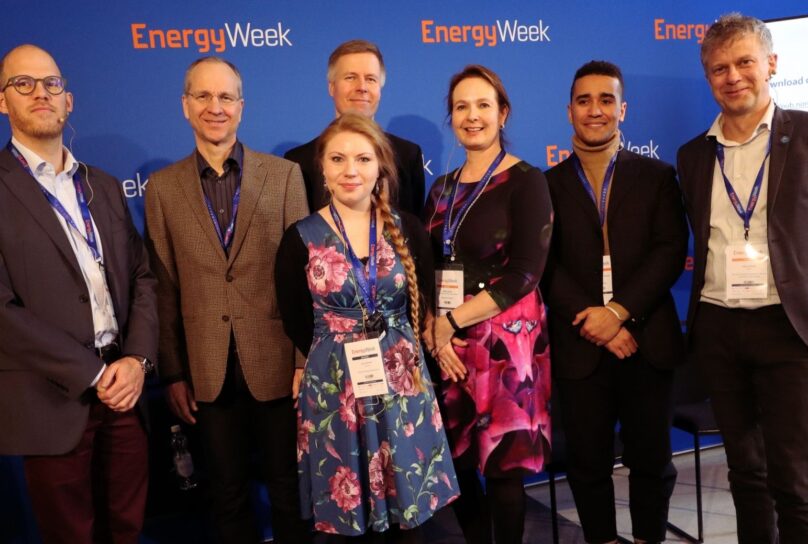On Wednesday afternoon, a seminar at Vaasa EnergyWeek looked into the future of sustainable and resilient clean energy systems in the Nordic countries. Three new studies were presented, focusing on the lessons learned under the present energy crises, inflation, and its social consequences in the Nordic and Baltic countries, the ”Nordic trilemma”, and bioengineering.
During the opening remarks, moderator Helena Sarén, Business Finland’s Head of Zero Carbon Future mission, expressed her view on the energy sector being the most interesting sector to work in at the moment. She then promptly addressed Finnish companies with an open invitation:
”We want companies to know more about our Nordic research. We also urge Finnish companies to activate and join our Nordic friends in the challenges we face today.”
Nordic resilience needed in changing times
The Nordic countries share a common goal of becoming the world’s most sustainable and integrated region. Secure, affordable, and clean energy is essential to achieve this goal.
However, there are challenges to overcome, one being the rising energy and commodity prices in Europe. As a result, consumers have been facing increased pressure on their budgets, with energy bills reaching unprecedented levels.
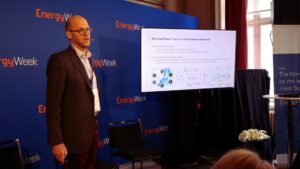
Bálint Menyhért is a PhD economist with research experience in the fields of socio-economic analysis, poverty measurement, resilience, monetary macroeconomics, and economic history. His recent research suggests that the social situation today is serious and needs a coordinated policy response.
”Nordic countries are doing better with less inflation inequality and lower social costs, but Baltic countries are struggling with high inflation inequality and potential poverty,” he says.
Energy poverty a common threat
This does not mean that the Nordic countries are out of the woods. Due to within-country differences in consumption patterns and living cost adjustments, these findings can vary. Especially rural communities, large households, children, and the elderly may find themselves in a similarly precarious situation as in the Baltics.
This kind of social and economic inequality that inflation causes can be a significant barrier to achieving sustainable development.
”It is considered energy poverty when energy bills account for more than 30% of a consumer’s income,” Menyhért explains.
According to Dr Menyhért, developing indicators for and measuring energy poverty can support a more targeted approach that protects energy-poor consumers from unaffordable energy bills while preserving incentives to save energy.
Risky geopolitical environment threatens the green transition
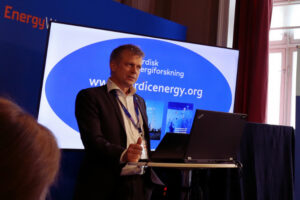
Klaus Skytte, CEO of Nordic Energy Research, presented the so-called ”Nordic Energy Trilemma”; security of supply, affordability, and just transition. According to Skytte, these are three conflicting challenges to delivering a secure, affordable, and sustainable energy transition in the Nordic region.
”Earlier crises have forced Nordic solutions that have later been implemented globally, yet now we are facing an energy trilemma,” Klaus Skytte says.
The Nordic region needs to meet energy demand reliably, withstand system shocks, and prepare for a sharp increase in electrification, all while providing equitable access to abundant energy as well as delivering a positive climate and environmental impact.
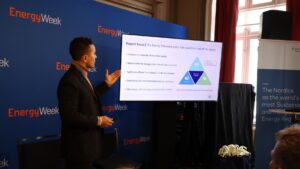
”It is a perfect storm that has occurred, leading to higher energy prices,” says Marton Leander Vølstad, Adviser at Nordic Energy Research.
To balance this energy trilemma and achieve a more secure region, Vølstad suggests we need to support flexible demand-side response and strengthen the Nordic electric grid infrastructure.
”We need to reemphasise the importance of Nordic collaboration in energy markets and systems and share learnings of nationally applied financial support schemes. One thing that the Nordics have done really well is communication. Well-put-together information campaigns and digital knowledge sharing are important for public acceptance.”
Coexistence is key
The final presentation of the seminar revolved around nature-inclusive design (NID) as a way of solving the pressing issue of offshore wind and its impact on nature and livelihoods in the region.
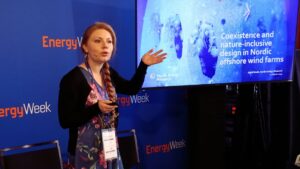
Astrid Bratli, Adviser at Nordic Energy Research, notes that,
”The anticipated twentyfold increase of Europe’s offshore wind capacity, to reach climate neutrality by 2050, is invasive on biodiversity. These offshore wind projects will create new challenges for ecosystems, commercial activities, and marine spatial planning. Impacts on nature must be carefully managed.”
According to Bratli, a more holistic approach and cooperation between all the stakeholders is key to solving these challenges. Nature-inclusive design is an important approach to minimise the impact of offshore wind projects on marine ecosystems and promote the coexistence of renewable energy development and biodiversity conservation.
”This holistic thinking should be implemented already when screening the areas for offshore wind,” Bratli says.
It can also mean that some sites are not touched at all. A minimal impact on sensitive ecosystems, migratory routes, and breeding grounds of marine species are at the core of this approach. This can be accomplished by, for example, choosing cable routes that avoid important habitats as well as by creating artificial reefs and fish aggregation devices.
The best thing for nature, Bratli admits, is to build nothing. However, as people are not willing to give up their hair dryers and Teslas quite yet, this is the reality of society right now.
Cooperation and knowledge required
The seminar concluded with commentary from Wärtsilä’s Jari Hyvönen and Fingrid’s Tuomas Rauhala. According to Rauhala, cooperation and knowledge are key to solving tomorrow’s challenges.
”The talents have to be kept motivated and be ready for the upcoming challenges. It must be possible to make dreams come true here. We have plenty of issues and development to do now and also 10-15 years from now. It is a matter of the old and new world, as I see it. A long-term perspective needs to be in place so we can forecast these needs better.”

Jari Hyvönen suggests a bottom-up approach, thinking that many companies do not know the opportunities that are available. There is a need to get the word out and activate researchers in the field.
”We need expertise from different areas. The way ahead is to get connected and link the research together,” he says.
When asked what he would wish policy makers to do, Hyvönen argues that technology should be neutral.
”Fully electrical is not the correct way. We will find the best solution if you let us,” he says.
READ ALSO:
EnergyWeek: The next five years are crucial for the circular economy

